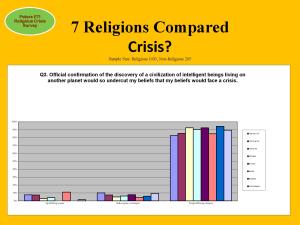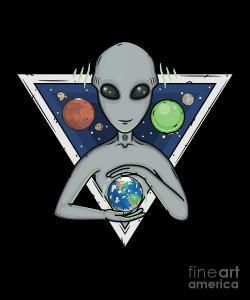 NASA and religion? Really? Yes, really.
NASA and religion? Really? Yes, really.
NASA and Priests Preparing for ETI Contact? SR 1168
“NASA is hiring priests to prepare humans for contact with aliens,” reads one headline. “NASA paid priests to figure out how to deal with aliens,” reads another. [Alien in spiritual triangle by Thomas Larch]
Is NASA actually teaming up with clergy to better prepare terrestrial society for extraterrestrial encounter? Yes. And No. Sorta. But, it’s old news. The consultation took place during 2016 at Princeton University’s Center for Theological Inquiry. It took the media only a half dozen years to report the story.
Whether old news or new news, the interaction between science and religion as well as the cultural impact of space research are topics on the public theologian’s agenda. I was not part of the NASA and religion team, but I still ask: Will confirmation of extraterrestrial intelligence precipitate a crisis for terrestrial religion?
Will we earthlings lose our religion?
One scholar in the NASA and religion study team was Cambridge University biologist and theologian Andrew Davison. Dr. Davison had just the right credentials to ask the right question: what can we forecast regarding religious reactions to confirmation that we share our cosmos with intelligent aliens? Davison, who writes frequent editorials for our CTNS (Center for Theology and the Natural Sciences) journal, Theology and Science, will publish a book on this topic later in 2022. The book? Astrobiology and Christian Doctrine.
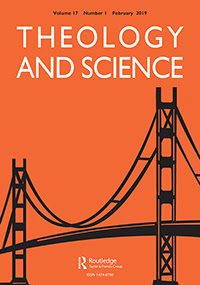 Can we forecast that terrestrial Buddhists or Christians or Muslims will face a faith crisis when meeting higher intelligences from space? Will religious adherents give up their beliefs? No, claims Davison. Rather, he says, a “large number of people would turn to their religious traditions for guidance” in the event of a universe-expanding discovery.
Can we forecast that terrestrial Buddhists or Christians or Muslims will face a faith crisis when meeting higher intelligences from space? Will religious adherents give up their beliefs? No, claims Davison. Rather, he says, a “large number of people would turn to their religious traditions for guidance” in the event of a universe-expanding discovery.
I believe Dr. Davison shares the better part of wisdom on this topic.
The Peters ETI Religious Crisis Survey
I love to spend time on topics such as astrobiology and UFOs. See recent posts such as “Are Alien Scientists the Real Gods?” and especially, “Would confirmation of extraterrestrial intelligent life cause a crisis for terrestrial religion?”
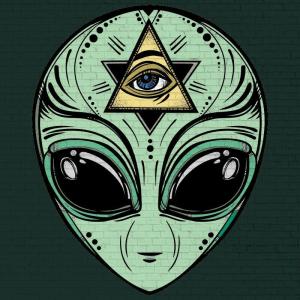 Here is my way of formulating the question: What would be the impact on religious belief systems should we Earthlings wake up one morning and find ourselves keeping company with extraterrestrial neighbors?
Here is my way of formulating the question: What would be the impact on religious belief systems should we Earthlings wake up one morning and find ourselves keeping company with extraterrestrial neighbors?
So, what’s the problem? As I mentioned in previous posts, scoffers, journalists, and some scientists bluster that terrestrial religion would collapse under the weight of confirmed knowledge of extraterrestrial intelligence (ETI). Because Christianity and most religious traditions formulated their key beliefs within an ancient worldview now out of date, would shocking new knowledge dislodge our pre-modern dogmas?
Let’s ask: are Christians Earth-centric, so that contact with ETI would de-center and marginalize our sense of self-importance? Do our traditional religions rank us human beings on top of life’s hierarchy, so that if we meet ETI who are smarter than us will we lose our superior rank? If we are created in God’s image, will we have to share that divine image with our new space neighbors? In sum, would confirmation of the existence of ETI cause terrestrial belief systems to collapse? And if terrestrial religious belief systems collapse, will theologians find themselves out of a job?
To answer these questions let’s look at some data and then look at some theology. First, the data. With the help of a former student assistant, Julie Froehlig, I conducted The Peters ETI Religious Crisis Survey. That is, I asked people about their faith. That’s a good source for data, isn’t it?
Question 3 of the survey is very informative. Here it is: “Official confirmation of the discovery of a civilization of intelligent beings living on another planet would so undercut my beliefs that my beliefs would face a crisis.” Almost nobody checked Agree or Strongly Agree. More than 90% checked Disagree or Strongly Disagree. This is the case for evangelical Christians, fundamentalist Christians, Roman Catholics, mainline Protestants, and also for Buddhists, Mormons, and the self-identified non-religious. In sum, believers in every religious tradition tested affirm an integration of new knowledge regarding ETI (Peters 2008) (Peters, The Implications of the discovery of extra-terrestrial life for religion 2011).
From Astrobiology to Astrotheology
Ufologists study UFOs (now called UAPs, Unidentified Aerial Phenomena). Astrobiologists ignore UFOs and UAPs in order to study microbial life within our solar system and ETI elsewhere in the Milky Way.
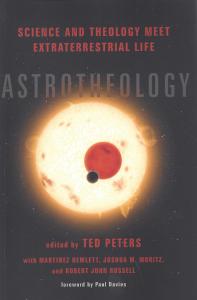 It’s time to introduce astrotheology. Astrotheology is that branch of theology which provides a critical analysis of the contemporary space sciences combined with an explication of classic doctrines such as creation and Christology for the purpose of constructing a comprehensive and meaningful understanding of our human situation within an astonishingly immense cosmos (Peters, Introducing Astrotheology 2018, 11-12). Our CTNS scientists and theologians have put together a comprehensive and defining volume, Astrotheology: Science and Theology Meet Extraterrestrial Life.
It’s time to introduce astrotheology. Astrotheology is that branch of theology which provides a critical analysis of the contemporary space sciences combined with an explication of classic doctrines such as creation and Christology for the purpose of constructing a comprehensive and meaningful understanding of our human situation within an astonishingly immense cosmos (Peters, Introducing Astrotheology 2018, 11-12). Our CTNS scientists and theologians have put together a comprehensive and defining volume, Astrotheology: Science and Theology Meet Extraterrestrial Life.
Let me repeat a previous recommendation. Please pay attention to the fine work of astrotheologian, David Wilkinson. Wilkinson is an astronomer and Methodist theologian.
Wilkenson does not believe Earth is being visited by aliens piloting flying saucers. Yet, he supports SETI (Search for Extraterrestrial Intelligence) and other work by scientists in hope of meeting new friends living on exoplanets.
This is important for Christians, he says, because we need to appreciate how expansive God’s creation really is. “Human beings are not the centre of the universe. In fact, it is the human belief that we are the centre of all things that the Bible calls sin….God is the centre of all things, and we are creatures given status by his love” (Wilkinson 2013, 148). By decentering ourselves on Earth we can appreciate more fittingly our humble place in God’s magnificent cosmos.
Is belief in aliens Satanic?

But, aren’t aliens sent here by Satan? There is no evidence for this.
Nor is there any evidence that ETI are hostile. There is no reason for earthlings to feel threatened.
Those friends of yours who tell you so are very few in number. If they pester you, tell them to buzz off, but of course with “gentleness and respect” (1 Peter 3:15) (Peters, Reasons for the Hope Christians Have 2021).
Conclusion
For more on space and theology, see videos on The Cosmic Matrix: Science, SETI, and UFOs.
NASA and religion? Really? Yes, really. But don’t burn your rocket fuel too quickly. First it’s old news. Second, we have no evidence that NASA has paid any attention to what the priests let alone astrotheologians have said.
References
Peters, Ted. 2018. “Introducing Astrotheology.” In Astrotheology: Science and Theology Meet Extraterrestrial Life, 3-26. Eugene OR: Cascade Books.
Peters, Ted. 2021. Reasons for the Hope Christians Have. Roger Olson’s Patheos Blog.
Peters, Ted. 2011. “The Implications of the discovery of extra-terrestrial life for religion.” The Royal Society: Philosophical Transactions A 369: 644-655.
Peters, Ted. 2008. The Peters ETI Religious Crisis Survey.
—. 2014. UFOs–God’s Chariots? Spiritualiy, Ancient Aliens, and Religious Yearnings in the Age of Extraterrestrials. 2nd. Pompton Plains NJ: New Page Books.
Wilkinson, David. 2013. Science, Religion, and the Search for Extraterrestrial Intelligence. Oxford: Oxford University Press.
▓
 Couterbalance hosts the raw data for the Peters ETI Religious Crisis Survey.
Couterbalance hosts the raw data for the Peters ETI Religious Crisis Survey.
Along with Martinez Hewlett, Joshua Moritz, and Robert John Russell, Ted Peters co-edited, Astrotheology: Science and Theology Meet Extraterrestrial Intelligence (2018). Along with Octavio Chon Torres, Joseph Seckbach, and Russell Gordon, he co-edited, Astrobiology: Science, Ethics, and Public Policy (Scrivener 2021). He is also author of UFOs: God’s Chariots? Spirituality, Ancient Aliens, and Religious Yearnings in the Age of Extraterrestrials (Career Press New Page Books, 2014). See his website: TedsTimelyTake.com.
▓


